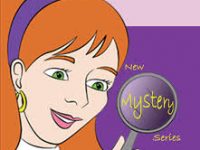Summer Readers Becoming Summer Writers
This is a guest blog post written by Beth Fine, the author of all the great books at http://imaginepurple.com

If the maxim “Readers are writers” could instantly convert your homeschooled kids into Shakespeare, Browning, or Grisham, your bookshelves would bulge with their massive output. However, having taught a workshop called “How to Turn Your Adventures into Stories,” I have found the process might take a few extra steps, steps that can relate meaningfully to a future writer’s own life. For example, I will share my experience.
As a kid born in Texas, I had lots of adventures. I rode horses, waded in bayous, explored drainage pipes, raced bikes, secretly adopted a dog, wrote songs, listened to detective stories on the radio, & read-read-read adventure stories.
In the summer, we had to stay inside or in the shade from noon to 3 p.m. I usually went to my treehouse to read Tom Sawyer, Huck Finn, The Bobbsey Twins, or Hardy Boys. But strangely the orange biography series of famous Americans proved my favorite.
Every Monday night, my mother took us to the library. She’d get that week’s bestseller, and I’d check the bottom shelf of the children’s section to see what had just arrived.
Finally, in the fourth grade, I felt ready to write stories myself. I wrote two novels, one of which had 26 chapters. Over a month, my teacher let me read that book while the kids laid their heads on the desk after lunch recess.
My story told about a tomboy who disappeared one dark and rainy day. All the neighbors searched for her but only found her raft stuck in the middle of the bayou, a horse bridle slung onto the bayou banks, and one sandal flung on a path into the woods. A mystery had begun with the bayou telling the where, a horse bridle hinting at the what might have happened, and a sandal suggesting summer as the when. I knew that stories usually included such details.
When I finished the book, the kids said they liked how it came from my own experience. Accidentally, I had stumbled onto the first premise of writing: “Write what you know!”
Later that same year, the school selected me along with five boys in higher grades to appear on the Radio Quiz Down Show. A reporter took pictures and asked what I wanted to be when I grew up. I instantly replied, “A writer.”
The next morning’s Houston Post said I wanted to be a reporter. I cried for days because I’d been “done wrong”! The newspaper misinterpreted me. By writer, I meant a writer of novels but didn’t have the word “novelist” in my vocabulary yet. So, accidentally, I learned two more, very tough lessons that year.
- A writer must say clearly what he means and must mean what he says.
- A writer must stand up for what he thinks even if it sounds silly or weird.
Those insights showed me, a kid writer, that I must figure out my opinion and to do so I must “lead the reader” to the solution to the story, even if it takes having my characters argue or fist fight. Such an action could wake up a reader and urge him to continue the story to the end.
I hope my bumpy start at writing will spur you to pick up a pencil or turn on the computer to begin an untold adventure from your real life.
Latest Posts

Guest Post by Gabriel Morse For several years, I sat for long hours every day behind one of those battleship gray desks in a windowless, dull, gray office. The pay was enough to take care…
Read more >
This post is sponsored by Little Monsters Universe. I'm Tina Salmanowitz, an advocate for homeschooling and science education. With over a decade of experience as a science educator (in class…
Read more >
This post is sponsored by Time4Learning. Before the pandemic, it was business as usual for Boca Raton resident Nikki Warris. Her two daughters, 5-year-old Natalie and 8-year-old Lexi were…
Read more >


